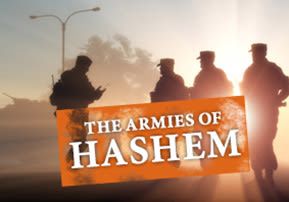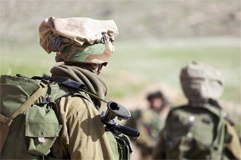
Bamidbar: The Armies of Hashem
Why does the Torah all through the Book of Numbers talk about the Jewish People in military terms? An army that lacks unity and cohesiveness isn't worth much...

An army that lacks unity and cooperation between its various branches isn't worth very much. What's more, every branch and every soldier within his respective branch of service has a unique and important task to fulfill. No one soldier or branch is independent – they all need one another, for no one can fight alone. The army as a whole must have an air force, a navy, a tank corps, engineers, infantry, artillery intelligence and a myriad of service units to be able to fight on all fronts – air, land and sea.
A soldier who considers himself better than any other soldier lacks basic common sense. The infantry, when attacked by enemy planes, needs the help of their own fighter pilots. By the same token, the fighter pilot, when downed by enemy anti-aircraft fire, is dependent on the dedicated soldiers of an elite infantry unit to go behind enemy lines and bring him to safety. Every soldier needs every other soldier and every individual is dependent on the cohesiveness function of the army as a whole. The artillery provides massive fire support for the soldiers in the front lines, and the soldiers in the front lines protect the artillery from enemy infiltration. The intelligence corps depends on infantry reconnaissance to verify information first-hand on the ground, yet the infantry reconnaissance relies heavily on accurate intel before embarking  on a mission. An infantry recon commando would be ridiculous in feeling superior to the intel soldier who sits in an office in front of a computer monitor, for that soldier's safe execution of his duty depends on the information he receives from that soldier behind the desk. The example of the mutual dependence within the military framework are endless.
on a mission. An infantry recon commando would be ridiculous in feeling superior to the intel soldier who sits in an office in front of a computer monitor, for that soldier's safe execution of his duty depends on the information he receives from that soldier behind the desk. The example of the mutual dependence within the military framework are endless.
Interestingly, the Torah speaks of Klal Yisrael, the Jewish People, in military-style metaphors.
"Every person who comes from the legions of Israel…" (Numbers 1:3).
The Torah in Parshat Bamidbar calls the Jewish People, “the legions of Israel”. Why legions? The “Kli Yakar” explains that each the legions of Israelites in this world correspond to the legions of angels in the upper worlds, for each Jew resembles an angel. Compared to the Gemara, this is an understatement, for a Jew who succeeds in subjugating his body to the will of his soul is higher than an angel. As such, every Jew, like every soldier, is vital and important.
Like the army, the Jewish People need their separate “legions”. Everything in the world is the product of Divine design, planning and creation; the Jewish People are no different. Just as an army needs its various branches, Hashem created the Jewish People with Ashkenazim, Sephardim, Chassidim, Lithuanians, and kipot srugot (national religious). Within each legion are scores of individual battalions, each with its separate customs and accent. Within the Sephardim, you'll find Parsiim (Iranian Jews), and within the Parsiim you'll find Tehranim and Mashaadim. Within the Ashkenazim, you'll find Chassidim, and within the Chassidim you'll find dozens of groups. Hashem does nothing without a purpose – each group and each individual with the group is vital.
Nothing, in light of the above, is more stupid than the lack of Jewish unity and the lack of respect for one another. Each of us will see how we were dependent on every other Jew. It's about time that every one of us begin to love every other Jew if we ever expect to see Moshiach and the full redemption of our people, speedily and in our days, amen!












Tell us what you think!
Thank you for your comment!
It will be published after approval by the Editor.